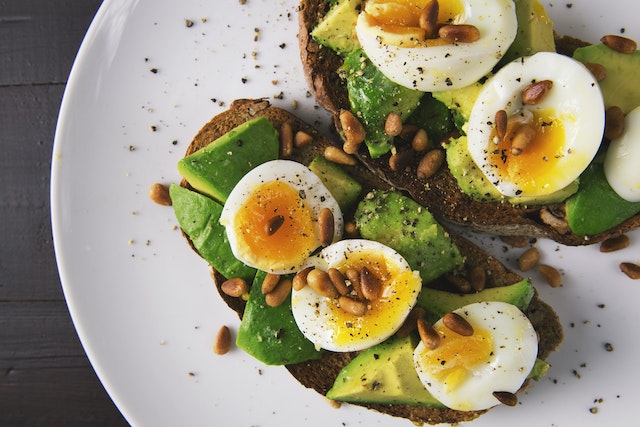Introduction
Diet plays a vital role in weight loss and is often neglected. Sometimes we fall into the trap of fad diets, and sometimes we do not have a clue. With so many weight loss diet options available, it is easy to lose sight and not know what would work best for you. This is why we have curated a list of the best diet plans to help you accelerate your weight loss.
Low-Fat Diet
A low-fat diet restricts the amount of fat consumed daily. A low-fat diet mainly includes many vegetables like carrots, broccoli, tomatoes, cauliflower, and fruits like apples, kiwis, bananas, and melons. It also includes whole grains, legumes, and protein sources like egg whites, and full-fat fair products like cheese and milk are avoided. Apart from significant weight loss, a low-fat diet can also help you in reducing the risk of obesity and heart diseases and can also help in lowering cholesterol levels.

Low-Carb Diet
A low-carbohydrate diet causes our bodies to produce more ketones, acids that help break down fat for use as energy. Consequently, weight is significantly reduced. This diet plan restricts high-carb foods like sweets, pasta, bread, soft drinks, and other high-carb sources. A low-carb diet is rich in protein, fats, and other nutrients and contains a lot of fruits and vegetables. This diet plan has been shown to help with weight loss, improve blood sugar levels, and reduce the risk of chronic diseases.
The Zone Diet
Following a zone diet, one must consume a specific quantity of protein, carbohydrates, and fat at each meal. The zone diet follows a ratio of 40% carbs, 30% protein, and 30% fat. You get 3 meals and 2 snacks throughout the day in the zone diet. It emphasizes eating smaller meals throughout the day.
Mediterranean Diet
The Mediterranean diet includes vegetables, fruits, nuts, legumes, fish, and poultry and restricts the consumption of highly processed food and added sugar.
The diet is known to have many benefits, such as it improves your heart health, helps maintain healthy blood sugar levels, and is beneficial for brain health. Several studies have shown that this diet is good for weight loss and can help reduce the risk of chronic diseases.

Keto Diet
A ketogenic or keto diet is a low-carb, fat-rich diet whose main goal is to restrict the body’s carbohydrate consumption to enter ketosis, which is the state in which the body breaks down the stored fat for energy, which causes weight loss.
Apart from weight loss, a ketogenic diet has several benefits. This weight loss diet can help improve cholesterol levels, blood pressure, and blood sugar. It may also help in reducing the symptoms of Alzheimer’s disease and slow its progression.
Intermittent Fasting
Your window for eating is constrained by intermittent fasting, which is an easy approach to cutting calories. There are several types of intermittent fasting. For example, 16-8 fasting includes a daily fast of 16 hours and an eating window of 8 hours.
The 5:2 approach includes regular eating for 5 days and restricting calorie consumption for two days. If you don’t compensate by overeating during permitted eating times, this may result in weight reduction.
Intermittent fasting improves insulin sensitivity, anti-aging effects and also improves brain health.
Volumetrics Diet
This diet involves filling the plate with the foods that provide the most nutrition and the least calories. The fewer calories you consume, the more weight you’ll lose. It also helps increase feelings of fullness and lowers appetite and cravings, aiding in weight loss. Increasing your intake of nutrient-dense fruits and vegetables like apples, grapefruit, carrots, spinach, etc., may also help your diet become more nutritious.
Atkins diet
The Atkins diet involves restricting carbohydrates while focusing on protein and fats. The diet is carried out in phases; the first phase involves cutting out carbohydrates; in the second phase, you introduce 15-20 grams of carbs into your diet; and in the next phase, you increase the range of food you can have and maintain the diet.
Flexitarian Diet
The flexitarian diet is a flexible eating style that promotes the intake of plant-based foods and beverages, includes dairy products and eggs, and recommends the consumption of meat less frequently and/or in smaller amounts.
It is different from the keto diet as, unlike keto, the flexitarian diet focuses on plant-based foods and less meat consumption. On the other hand, keto is a high-fat, low-carb diet that aims to shift the body to ketosis. It is the state in which the body uses fat as energy.
The flexitarian diet also helps decrease the risk of heart disease, helps in weight loss, prevents cancer, and helps in managing type 2 diabetes.
High Protein Diet
Including protein-rich foods such as eggs, seafood, legumes, and dairy food into your diet can be very helpful for weight loss as protein keeps you satiated for a long time and helps tame your appetite. It also helps in muscle building and retention. A low-carb and high-protein diet can help you lose extra inches off your waist while improving your bone health, boosting your metabolism, and lowering blood pressure.

These diets can certainly help you in losing weight. Still, other factors should be considered before starting with any diet, such as previous health history and underlying health conditions. It is necessary to let a professional decide what would work best for your body.
Elevate Now: An Answer to Your Weight Loss Worries
You should consider Elevate Now’s weight loss program as they are a team of obesity specialist doctors, dieticians, and trainers who curate a sustainable weight loss program based on your health history. What makes them different from others is that they tackle the weight rebound by resetting your metabolic setpoint.
Our bodies have a metabolic setpoint that forces them to maintain their body fat and weight levels. When you make dietary and lifestyle changes, your body stores energy and sends signals to the brain to eat more because it believes it is in survival mode. You often regain the weight you lost when you start eating more.

Elevate Now helps in resetting the metabolic setpoint to prevent weight rebounds. They provide a permanent, sustainable solution to your weight loss worries and help you lead a healthy life today. They’ll assist you in curating a diet for weight loss which will be curated according to your body requirements and health needs. So, now with Elevate Now, you can say goodbye to weight rebound by registering on their website today.
References:
- “Low-Fat Diet: Pros, Cons, and What You Can Eat – Verywell Fit.” 30 Nov. 2022, https://www.verywellfit.com/low-fat-diet-pros-cons-and-what-you-can-eat-5179228.
- “The Zone Diet: A Complete Overview – Healthline.” 4 Apr. 2017, https://www.healthline.com/nutrition/zone-diet.
- “Mediterranean Diet 101: Meal Plan, Foods List, and Tips – Healthline.” 25 Oct. 2021, https://www.healthline.com/nutrition/mediterranean-diet-meal-plan.
- “The Ketogenic Diet: A Detailed Beginner’s Guide to Keto – Healthline.” 22 Oct. 2020, https://www.healthline.com/nutrition/ketogenic-diet-101.
- “What Is the Flexitarian Diet? – Cleveland Clinic Health Essentials.” 25 May. 2021, https://health.clevelandclinic.org/what-is-the-flexitarian-diet/.
- Science-Backed Reasons to Eat More Protein – Healthline.” 8 Mar. 2019, https://www.healthline.com/nutrition/10-reasons-to-eat-more-protein.




